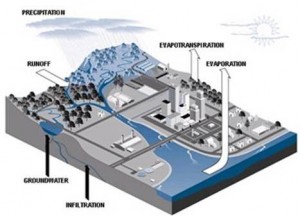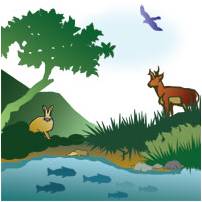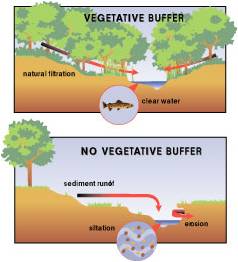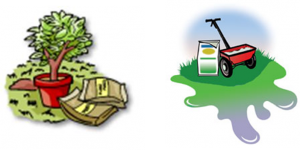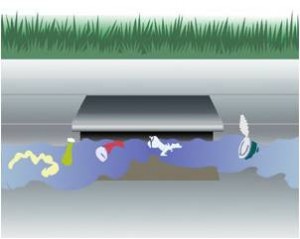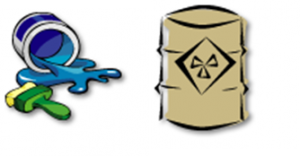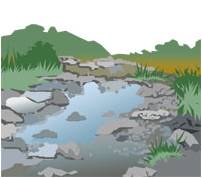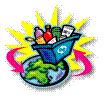Stormwater is defined as runoff water resulting from precipitation. It can contain, however, a variety of pollutants that can harm and hamper our environment to a greater degree than was previously  thought. Everything from oil spills, gasoline dripping from a nozzle, pesticides/herbicides being applied to wash water coming from washing a car or truck eventually ends up in our local waterways. In time, these pollutants can find their way into larger estuaries like the Chesapeake Bay and add up with the multitude of other storm water runoffs to kill off the aquatic life there.
thought. Everything from oil spills, gasoline dripping from a nozzle, pesticides/herbicides being applied to wash water coming from washing a car or truck eventually ends up in our local waterways. In time, these pollutants can find their way into larger estuaries like the Chesapeake Bay and add up with the multitude of other storm water runoffs to kill off the aquatic life there.
Our ecosystem is a circular one, as depicted in the diagram above. Since matter is neither created nor destroyed, we have to reuse our most precious resource, water. The water that rains down on us picks up pollutants and deposits them in our waterways before it evaporates back into the clouds. When it does so, it increases the pollutant concentration in our waterways, as the pollutants do not evaporate, but accumulate instead.
What Goes On the Ground, Sticks Around!
Impervious media such as asphalt and concrete that accompany urban areas create problems with the water from precipitation recycling through our ecosystem. The water runs off too fast for natural evaporation/transportation and/or groundwater recharge to take place. In the process of running off, the water picks up the oils and other pollutants that are on the paved surfaces. Even something as simple as pet waste left on a sidewalk makes an impact on the waters around us.
Some estimates predict that the Chesapeake Bay will be devoid of aquatic life within the next 50 years if we continue polluting at our current rate.
The County of Henrico has a massive and complex piping system to handle our rain water. This includes underground systems as well as above ground ditches, culverts, streams, creeks and rivers. Whenever you see water flowing during a storm, that water, along with anything it carries, will end up eventually in the Chesapeake Bay.
Why is it a concern?
Stormwater picks up any and all pollutants that are on the ground when it precipitates. Chemicals, debris, dirt and other pollutants flow with Stormwater into either a storm sewer system or directly into lakes, streams, creeks, rivers and eventually the Chesapeake Bay and Atlantic Ocean. Anything that enters a storm sewer system is discharged untreated into the water bodies we use for swimming, fishing and for providing drinking water.
Sediment Excess sediment is a serious pollutant. When it enters our streams and creeks, it clouds the water. This clouding prevents plant life from getting sunlight, without which they die. Sediment can also clog fish gills and kill them. Vegetative buffers act as a filter, slowing stormwater flow and allowing groundwater penetration. They also prevent the loss of topsoil and deposition of silt and sediment into the waterways.
Excess Nutrients (fertilizers) By far the biggest contributor to the poor state of the Chesapeake Bay to date, excess nutrients can cause algae blooms to grow out of control. When these blooms die, they decompose on the bottom of the waterway. While decomposing, they use up large amounts of oxygen in the process, which in turn kills fish and other aquatic life forms that need oxygen to survive. Simple things like following the directions on fertilizer products and fertilizing your lawn in the Fall instead of the Spring can make a big impact on reaching the Bay.
Fall fertilization is superior for a few reasons:
- The amount of rain in the Spring is much greater, taking more of the fertilizer with it into the waterways and less stays on your lawn.
- Disease and weed problems are usually less severe when Fall and late Fall fertilization are practiced.
- Heat and drought tolerance are usually better, enhancing the summer lawn quality.
- Grass plant produces more root mass and a deeper root system which results in an overall healthier plant.
What Goes On the Ground, Sticks Around!
Debris Bags, bottles, plastic six-pack rings, and even cigarette butts washed into water bodies can choke, suffocate and disable aquatic life such as ducks, fish, turtles and birds. The #1 thing people can do to help protect our waterways is stop polluting!
Household Chemicals Insecticides, pesticides, paint, solvent, used motor oil and other fluids can poison and kill aquatic life. Land animals and people can become sick or die from eating diseased fish and shellfish or ingesting polluted water. The landfill in Henrico County accepts household cleaners, use it instead of pouring your excess on the ground.
Used Oil – Appliances – Household Hazardous Waste Collection
Drinking water – Polluted Stormwater often affects drinking water sources (we here in Henrico get our water from the James River). This, in turn, can affect human health and increase drinking water treatment costs.
If you stop and think about it, the water we drink today has been around for millions of years. Over time, Mother Nature can filter out pollutants and impurities. But if you overload the system as we are doing, then it takes longer and longer for the water to be cleaned. Our impact on this filtration system is huge, and it is killing our aquatic system. Each individual needs to take an active part in preventing our waters from being polluted in the first place.
Bacteria and other pathogens can wash into swimming areas and create health hazards, often making beach closures necessary.
Please remember, ditches and storm drains are not connected to the sanitary sewer system. Whatever you put into ditches, street drains and even onto your lawn flows immediately into our recreational waters whenever there is a significant rain. We must all assume accountability for keeping pollutants out of our waters.
What Goes On the Ground, Sticks Around!
How does it affect me?
From destroying the local habitats of wildlife to spreading possible diseases, Stormwater pollution is a problem that has a wide scope of consequences
Contaminated drinking water since our primary water source is the James River, discharging pollutants into it eventually just brings those pollutants back into our bodies.
Mosquito breeding- clogged water ways give mosquitoes more places to breed. Many types of mosquitoes that can spread diseases to humans, prefer to breed in polluted water.
Lack of seafood one of the most precious local resources in this region is the seafood crabs, oysters, fish, clams all are becoming depopulated to a dangerous point due to pollution of the waterways. If things don’t improve soon, the seafood from the Chesapeake Bay and the surrounding waterways could cease to exist.
Learn More About Stormwater Quality
What can I do to help? (Household Dos and Don’ts)
There are many seemingly harmless household activities that actually wreak havoc with our water system. You can help by implementing your own “Best Management Practices” (BMP’s) around house. BMP’s are a general term applicable to any means, practice or technique that aims to significantly reduce or eliminate storm water pollution
Be Part Of The Solution… Don’t Pollute!
10 things you can do to prevent Stormwater Runoff Pollution:
- Never dump anything down storm drains or in streams
- Overuse of fertilizers, pesticides or herbicides is a major cause of stormwater pollution. Remember that what you put on your lawn eventually finds its way into our area canals, creeks, rivers and the Chesapeake Bay. So use fertilizers and herbicides sparingly.
- Vegetate bare spots in your yard
- Dumping your collected leaves, grass clippings and other yard wastes into ditches, canals or other storm drains causes serious drainage problems, as well as deteriorating the Bay. Compost or bag your yard waste, your garbage hauler will haul them away on the appropriate hauling day according to your address in this link: Leaf Collection
- Use least toxic pesticides and follow label instructions.
- Direct downspouts away from paved surfaces; consider a rain garden to capture runoff
- Take your car to a car wash instead of washing it in the driveway
- Check your car for leaks and recycle your used motor oil
- Pick up after your pet (pet waste is responsible for over 40% of the fecal contamination polluting our waterways)
- Have your septic tank pumped on a regular basis
Use this link to report a violators: Non-emergency on-line spill reporting



